27 Fun Growth Mindset Activities to Inspire Kids & Adults in 2025
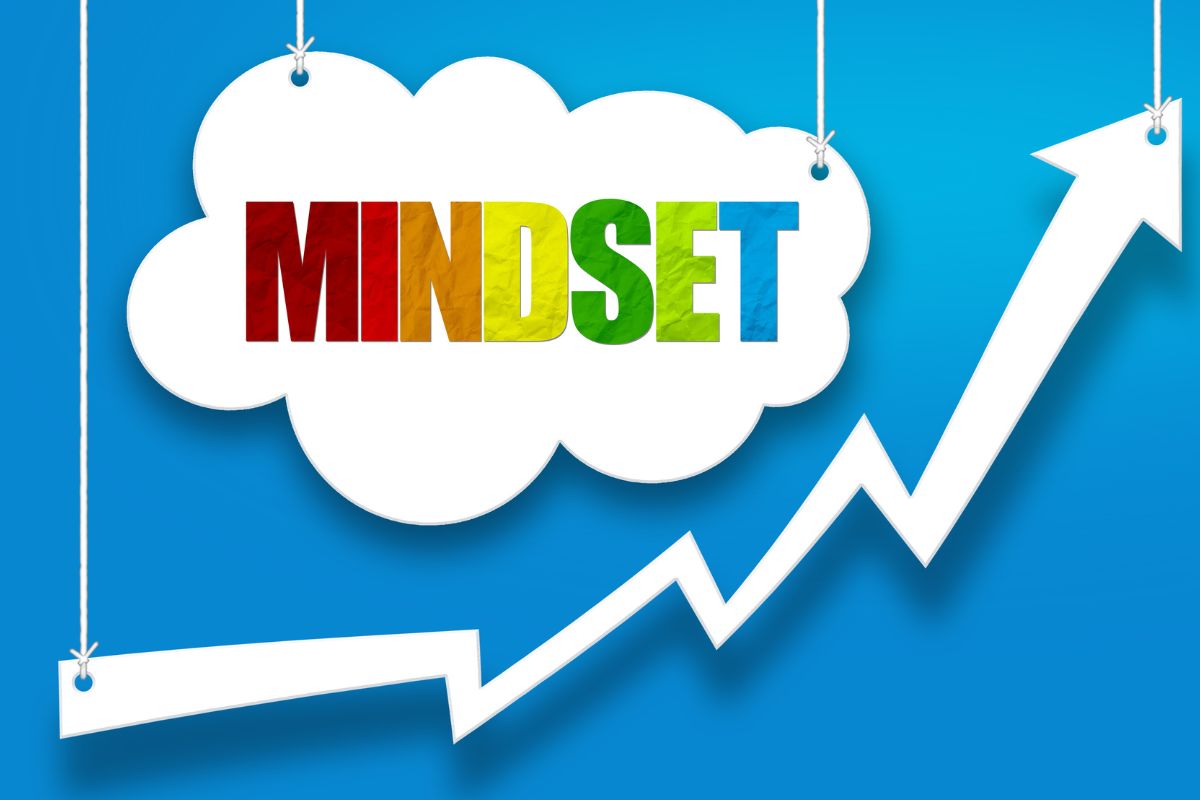
Growth mindset activities build resiliency and strength. Plus, it’s easier to be happy with an optimistic view.
You can do anything when life is about growth! Use these exercises for elementary school to middle, high school, and adults.
What is the growth mindset?
Our view of life drives our most basic thoughts and actions. The latest research shows that there are two types of mindsets: fixed and growth.
“A fixed mindset” person believes that intelligence, character, and ability are permanent. You are who you are, and extraordinary people were born that way.
It’s easy to…
- give up when the going gets tough.
- let your excuses get in the way of your dreams.
- think that you don’t have enough talent or skills.
A “growth mindset” person believes that growth is limitless. You challenge yourself daily and use failure as a stepping stone for progress.
Which one do you think goes farther in life?
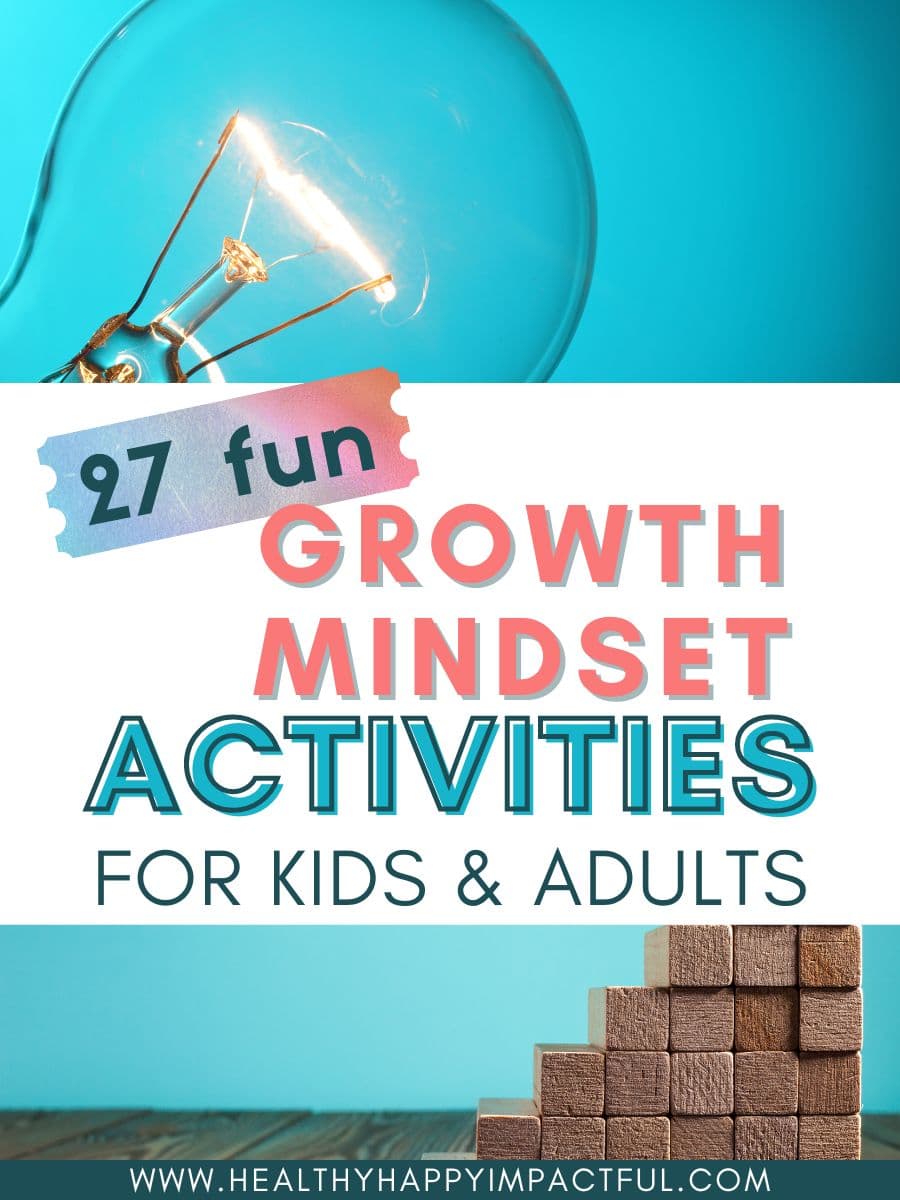
Would you like to save this idea?
How do I teach my child a growth mindset?
Wouldn’t it be great if we could thrive through challenges? We can! Start with hands-on growth mindset activities for your home or classroom!
1. Set the Standard
First, here’s the thing. If you don’t have a growth mindset in yourself, don’t expect it from your kids or coworkers.
Others don’t listen, they imitate.
So, use the exercises below to show what a growth mindset looks, sounds, and feels like. Spend time building your own mindset, and you’ll have a better chance of teaching it.
2. Explore Fun Growth Mindset Books
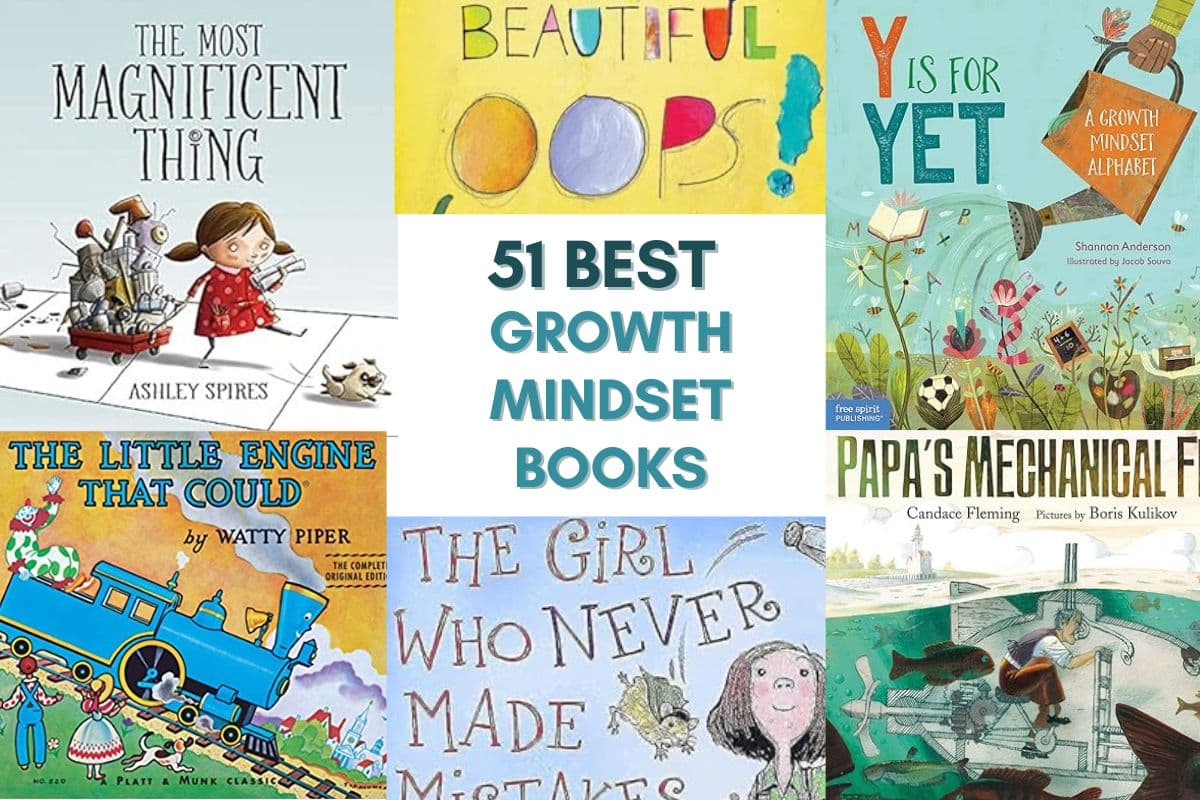
The world is built on engaging stories. And many enchanting books explain growth mindset better than a lecture ever will. So, put books in your library that get the key concepts of growth across in a fun way.
3. Ask Growth Mindset Questions for Kids (And Yourself)
Next, use these questions at meal times or bedtime to encourage a thinking shift:
- What did you do today that was hard?
- What mistake did you make today? Did you learn from it?
- What would you like to get better at?
- What is something you have gotten better at recently?
- What’s something you’re curious about?
- What did you do today that made you think?
Related: Great What If Questions to Ask Kids
4. Make An Action Plan for Failure
Failure is a key part of life.
It gives you critical feedback about what to improve on. So, when it happens…
- What’s your plan to bounce back?
- What strategies can you learn?
- How do you need to change course?
Write your plan on paper. Do this yourself as an adult, and do it with your child. Soon, you’ll both realize that failure is important.
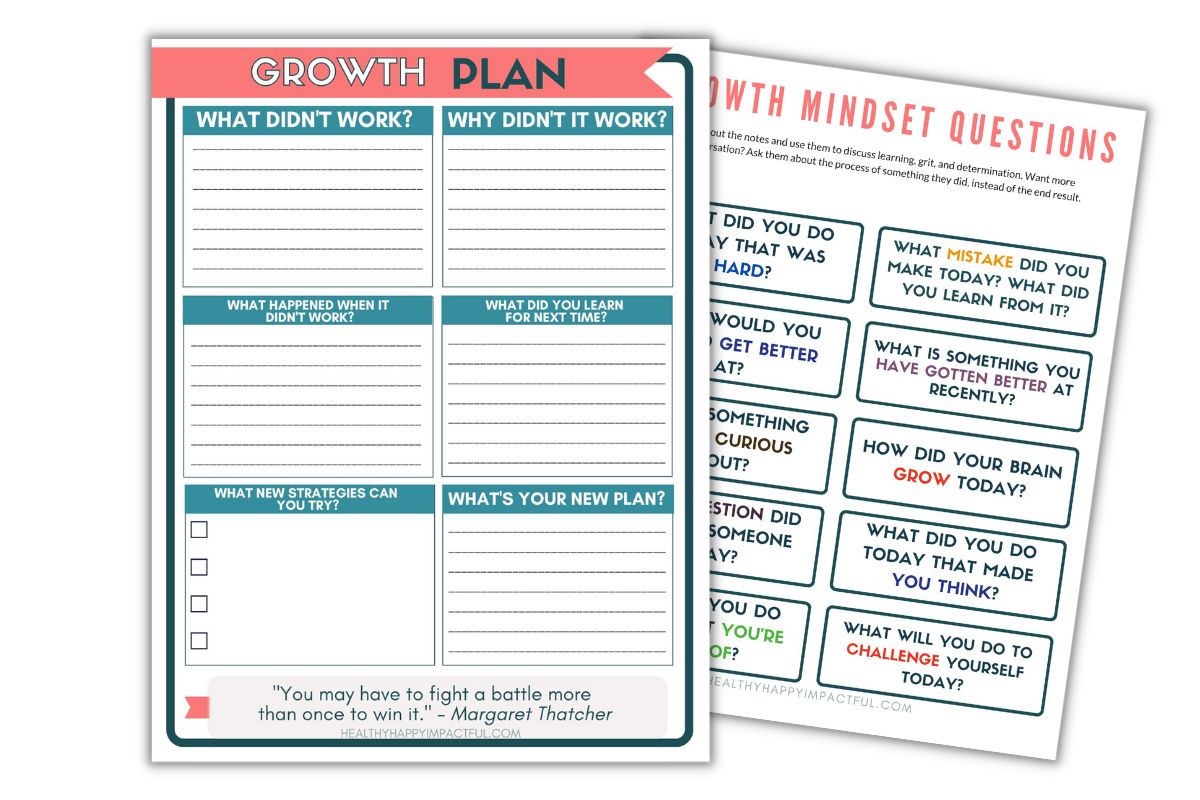
*A growth planning worksheet is included in my family growth pack!
5. Turn Negative Into Positive (Growth Mindset Kids Activities)
We all have a small voice in our heads that tells us negative things. So, spend a few minutes brainstorming the negative thoughts that you hear. Then, have everyone practice flipping those thoughts around.
Related: Best Kids Team Building Activities
6. Practice “How Can I Do That?”
This is mindset advice taught to adults, but applies to kids too. Often, we think to ourselves, “I can’t do that.”

But the person with a growth mindset instead asks, “HOW can I do that?”
See the difference?
The new question gets you thinking outside of the box. And instead of giving up, you’re inviting in creativity and possibility.
So, the next time you or your kids use “can’t.” Ask how instead.
7. Sort Fixed and Growth Mindset Sayings
Write these sayings on a slip of paper (or say them out loud).

Now, have kids tell you whether these are fixed or growth mindset phrases. (This activity reminds adults of what we want to encourage in our own thinking as well.)
8. Research Famous Failures: Growth Mindset Examples
These highly impactful people all struggled early. They realized that their initial challenges were only a part of learning for future endeavors.
They didn’t give up. So, share these growth mindset examples in action.
- Thomas Edison‘s teachers said that he was too stupid to learn anything.
- At the newspaper where Walt Disney first worked, his editors fired him because they thought he lacked imagination and good ideas.
- Oprah Winfrey was abused at the age of 9, ran away at 13, and was pregnant by 14 (she lost her baby shortly after birth).
- All 12 major publishers rejected the Harry Potter manuscript while J.K. Rowling was divorced, single parenting, and on welfare.

- Einstein didn’t begin speaking until he was 4 or reading until he was 7. Some thought he was mentally handicapped.
Point out that the world’s most successful people had ridiculously hard obstacles to overcome. Read for more famous people.
Who’s your favorite famous failure?
9. Share Good and Grit: Growth Mindset Dinner Activities
One variation on “high and low” at dinnertime is to share something good and something challenging from the day. In other words, share something that made you show up with determination.
Was it…
- a tough math test?
- a difficult client at work?
- trying something for the first time?
- a classmate who said something unkind?
By doing this every night, you’re training everyone in the family to problem-solve, learn from mistakes, and focus on growth.
*Related: fun dinnertime activities & best ice breaker games for kids
10. Praise Failure

One of my favorite stories is of a young female entrepreneur who came home from school every day to one question.
Her father asked her if she failed today. If the answer was yes, he gave her a hi-5. If not, he acted disappointed.
Now, because her childhood home life reinforced the value of getting out of her comfort zone, she has a much easier time doing so as an adult.
11. Use Growth Mindset Affirmations
Affirmations have the power to change your thinking over time. So, use them to change your mindset. Try one of these affirmations:
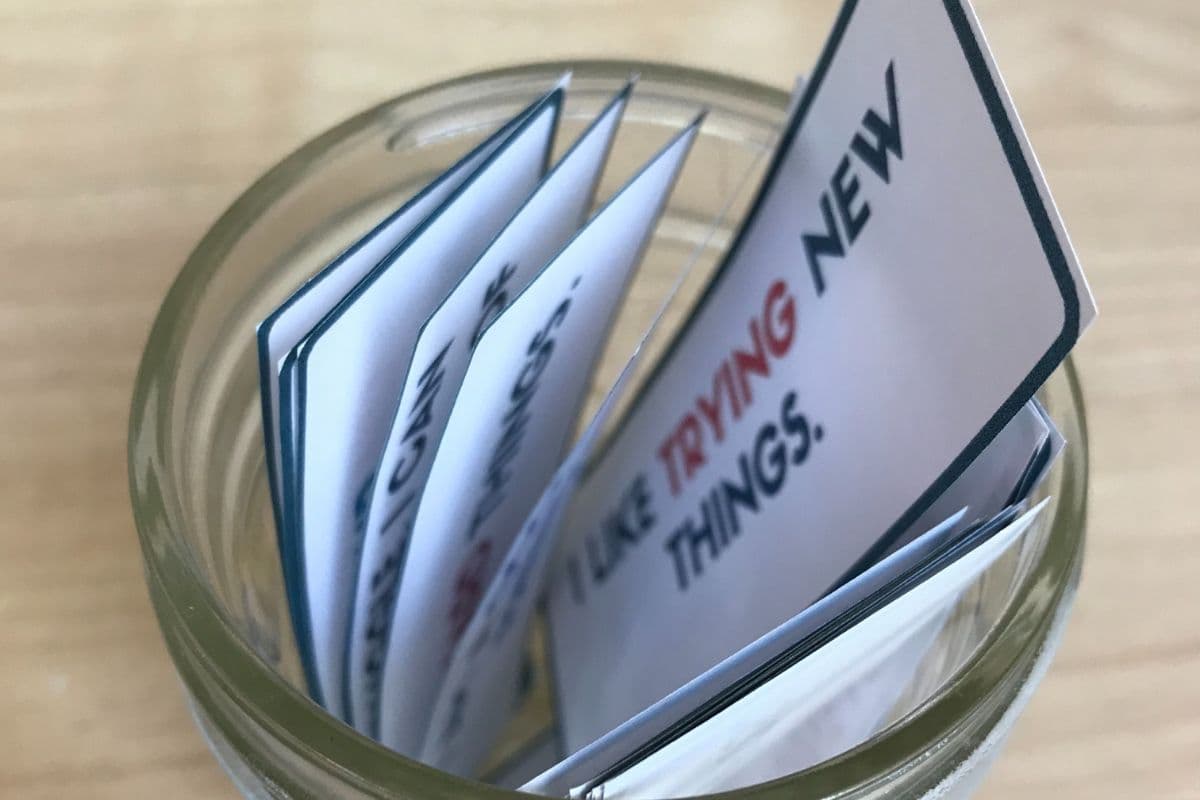
- I give my best effort.
- I can do hard things.
- I stay with a problem, even when it’s hard.
- Challenges make me stronger.
- If I can’t do something, it’s only because I haven’t figured it out yet.
- I can learn new strategies and ways of doing things.
Have your kids say them at breakfast or say them yourself in the shower.
For more positive self-talk, see: fearless self-love affirmations or positive kids affirmations.
Or grab access to the free pdf affirmation ebook!
12. Journal for a Growth Mindset
Next, use a journal to guide your thoughts of the day. Write a record of new experiences, things you’ve learned, and skills or habits to improve.
Check out more fun journal ideas for kids.
13. Inspire With Quotes
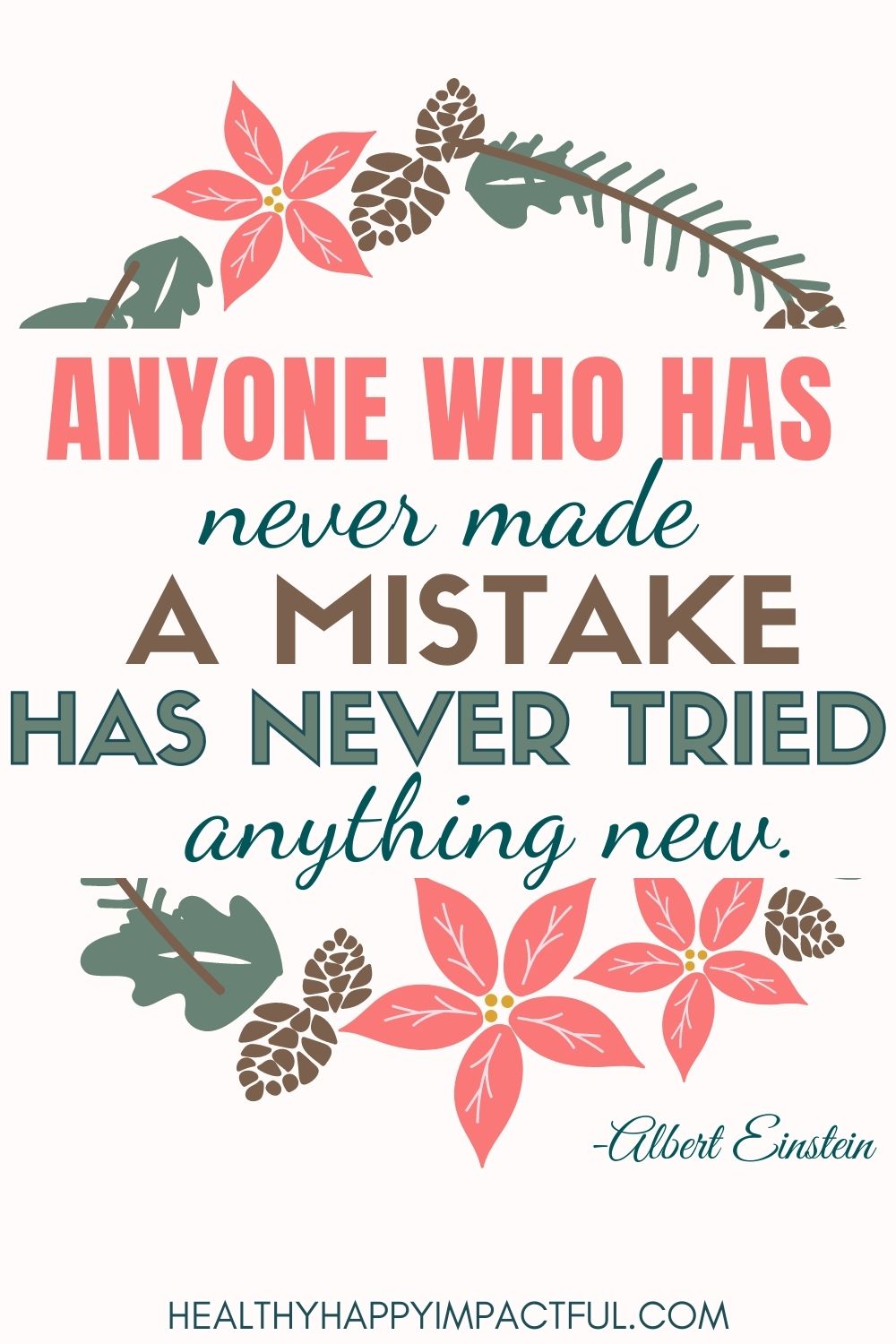
Beautiful growth mindset quotes will motivate your entire family. Put up the free wall art, and you’ll be constantly reminded of the growth mindset you are building.
14. Practice Adding Yet
As soon as someone says, “I can’t,” add “yet” to the end of the sentence.
I can’t do that math. Yet.
I can’t drive a car. Yet.
Now, make it a growth mindset game. Who can say it first? If your kids can beat you to saying “yet,” give them a fun reward coupon.
15. Try Role Playing: Growth Mindset Activities for Kids
*Great for elementary students and middle school

Next, use different scenarios to show kids when they’ll need to employ their growth mindset. Ideas include:
- If you struggle with something at school (or work)
- When your sibling or friend can do something you can’t (yet)
- If it takes you a long time to learn something.
Related: Kids Kindness Activities
16. Reward a Growth Mindset
Did you watch your child work her butt off even when it was hard? Did YOU decide to keep learning instead of giving up?
Reinforce these growth mindset activities by rewarding your kids or yourself in a healthy way! Check out:
We continue to do things that feel good, or are satisfying in some way. So, make it so!
17. Embark on New Adventures

Next, try new things as a family often.
Courage takes practice. It’s like a muscle. The more you use it, the easier it becomes to do uncomfortable things. So, get out of your comfort zone together and individually.
18. Learn About the Brain
Modern research reveals that the brain is more “plastic” than we originally thought. That’s great news! It puts learning, progress, and success in your own hands.
Learn more about neuroplasticity as a family >>
19. Talk About Goal Setting
*Great for teens and college students!
Does your child hope to accomplish something specific? Do you have a big goal in mind?
Review the steps of setting a SMART goal, and create a plan for following through.
School psychologist, Dr. Jamie Donnelly, says “The idea that abilities are not stable and there’s always room to grow, can help kids work harder towards their goals. If they know they can still improve, they will continue to try. Kids, especially in middle and high school, who haven’t been very successful, start to feel like they are a failure and give up. Growth mindset helps them realize that there is always room for improvement.“
20. Make Your Mistakes Visual
Have everyone in the group (or family) write a mistake on a piece of paper. Now, crumple up the paper and put it in a drawer. After a day or two, get those papers out and review them.
Discuss how it felt when you wrote down your mistake, versus how it felt later. Then, talk about how you can learn from the mistakes.
Related: 30 Easy Whiteboard Games to Play
More Growth Mindset Activities for Adults
While the ideas above work for any age, these growth mindset activities are powerful for adults.
21. Do a 30-Day Challenge
Are you in a rut, but not sure of how to get out? Check out this big list of 30 day challenge ideas, and pick one to jumpstart your life.
22. Ask for Feedback
Whether it’s work or parenting, it’s difficult to understand your blind spots on your own. Critical feedback is how you grow!
Therefore, ask your children questions that help you parent them, and ask your boss, colleagues, or audience what they’d like to see from you.
23. Learn Every Day
The single best thing I did for my mindset was to complete a year-long reading challenge. The amount I learned was mind-blowing (and my income tripled).
Plus, by prioritizing reading, I realized that life truly is a game of learning.
The more you know, the farther you go.
24. Refresh Your Daily Routines

Sometimes, it helps to start small. In this case, evaluate your morning routine and make note of where you can switch it up or add learning to your everyday habits.
Remember, one tiny change will lead to stunning results over time. (1% growth today =38% growth in a year)
25. Keep Your Mind Sharp
Are you training your mind to learn? If your memory is poor, or you’d like to sharpen your toolbox slowly over time, try an app like Elevate.
26. Practice Self-Reflection
Create a daily practice of reflecting on achievements and areas for improvement.
This not only helps you focus on the good, but also gives you insight into experiences that aren’t aligning with your values.
*Use these deep questions to ask yourself, and best questions to ask your future self to guide you.
27. Keep Your Big Picture In Mind
And finally, for adults, it’s easy to get jaded by news, busy days, and mundane routines.
Fight this! Occasionally deep-diving into your purpose and the legacy you’d like to leave behind.
What are your big life goals? What are your priorities? What would you like others to say about you after you’re gone?
Create a vision board to make these things clearer.
Benefits: Growth Mindset Exercises
And there are even more excellent reasons to cultivate a growth mindset:
- Improve self-esteem
- Take advantage of more opportunities
- Learn new and different skills
- Forgive yourself more easily
- Cultivate resilience
What’s Next?

I hope these exercises help you develop the mindset to live an inspired life.
Pick one or two to start today, and never stop growing friends! What are the growth mindset activities for kids or adults you’ll do this week?
More posts from Healthy Happy Impactful…
- How to Create Your Epic Vision Board – a free template to begin to plan.
- The Big List of Family goals examples – get dreaming together!
- The Best Non-Toy Gifts for Kids – all the meaningful, useful, and learning ideas in one place.


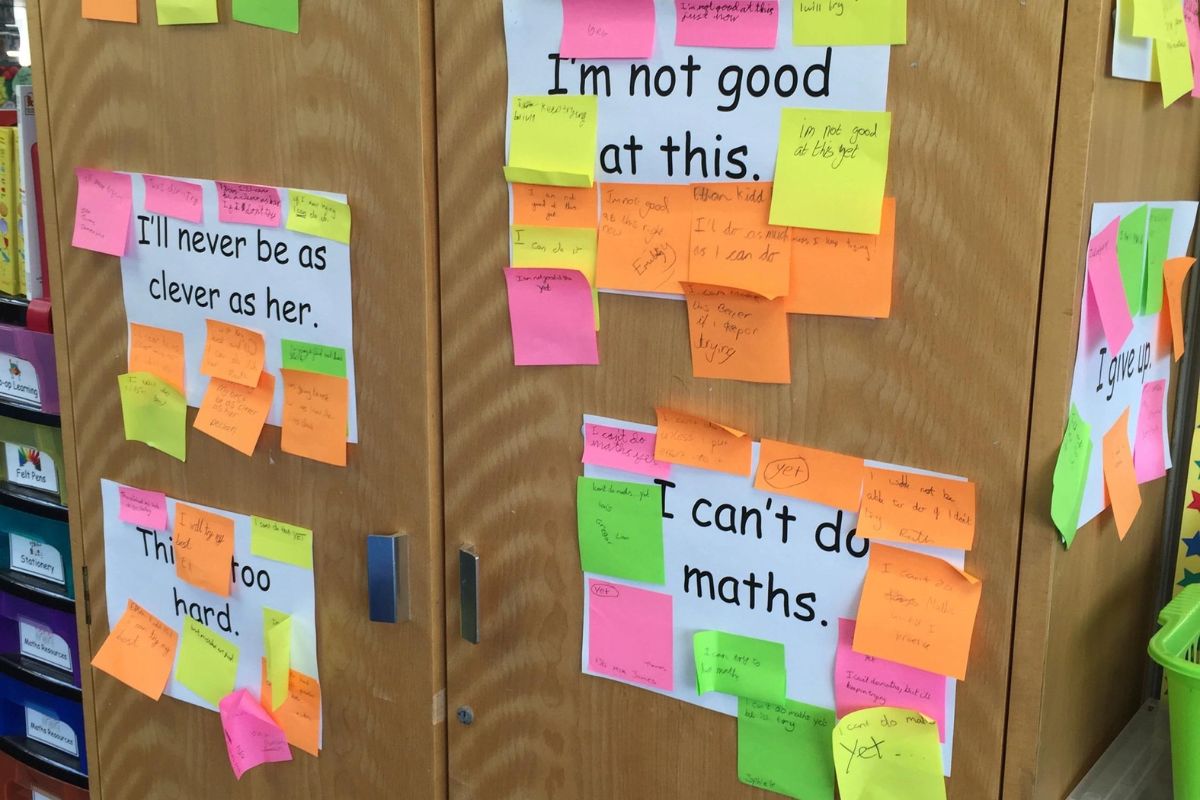
So many great ideas!
I’m glad you liked them Sarah! Thanks so much for sharing.